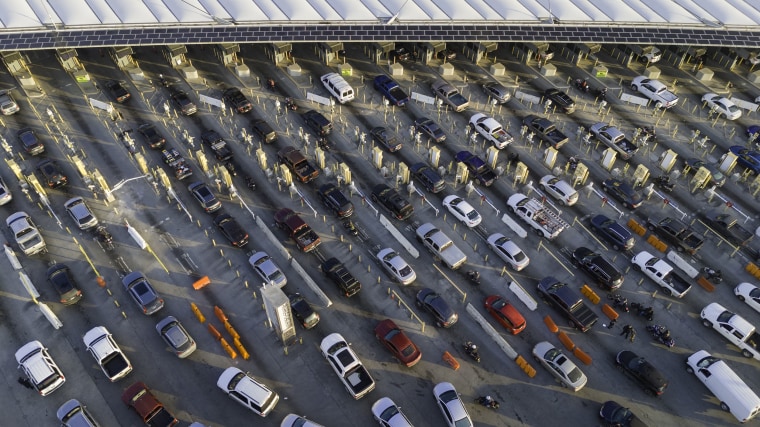WASHINGTON — When thousands of dollars' worth of pure methamphetamine was found in a car driven by Delilah Guadalupe Diaz, she claimed she didn't know about the illegal cargo.
Diaz's argument at trial failed, but her legal fight continued, with the Supreme Court on Tuesday considering whether prosecutors could submit evidence inferring that people convicted of being drug mules generally know what they are transporting.
Diaz was sentenced to seven years in prison and is appealing her drug trafficking conviction.
A U.S. citizen living in California, Diaz was stopped by a Border Patrol agent in August 2020 after crossing into the United States from Mexico at the San Ysidro port of entry.
She told the agent the car was her boyfriend's. The agent then asked her to roll down the rear window. She said it was manual, and the officer tried to open it himself. According to the Justice Department, the agent encountered resistance and heard a crunching sound, which can be a sign that drugs have been hidden inside the vehicle.
A search revealed 55 pounds of methamphetamine with a retail value of $368,550.
Diaz has maintained that she did not know the drugs were in the car, saying her boyfriend had loaned it to her when she was returning to the U.S. from a trip to Mexico.
At issue at the Supreme Court is a rule of evidence that was amended after John Hinckley Jr. was found not guilty based on his insanity defense for the attempted assassination of President Ronald Reagan in 1981. Congress amended the rule in an effort to exclude testimony by expert witnesses about a defendant's mental state.
The rule says "an expert witness must not state an opinion about whether the defendant did or did not have a mental state or condition that constitutes an element of the crime charged or of a defense."
At Diaz's trial, a Department of Homeland Security agent testified that drug cartels do not normally allow large quantities of drugs to be transported by so-called blind mules who are not aware of their cargo.
Diaz's lawyer unsuccessfully sought for the testimony to be omitted, saying it was the "functional equivalent" of telling the jury that she knew about the drugs.
During oral arguments Tuesday, the justices did not seem satisfied by either side's interpretation of the law, although there were indications the government could ultimately win.
Several justices indicated that in such cases, the defense could simply call their own witness to rebut the prosecution's expert.
Diaz's lawyers could have called "an expert who says there's no way for someone to suspect or know that the car has drugs in it," Justice Amy Coney Barrett said.
Some justices also indicated that as long as the witness does not directly address the defendant's state of mind, it might be acceptable to have general information about the type of people who are found to be drug mules.
"Couldn't you characterize it as the expert is speaking to the class of people who have drugs in their car and know about it?" Justice Ketanji Brown Jackson said.
Justice Department lawyer Matthew Guarnieri conceded that the government does not need to introduce the kind of evidence submitted in Diaz's case to win drug mule convictions. Such evidence is already barred in the courts covered by the New Orleans-based 5th U.S. Circuit Court of Appeals, which includes Texas.
Justice Neil Gorsuch, who seemed sympathetic to Diaz's argument, addressed that issue, noting the other evidence in Diaz's case that could have supported a conviction.
"The defendant couldn't open the window. The agent well knows that usually means there are drugs stuffed in the panels of the vehicle," he said. "I mean, one can draw an inference from that pretty quickly when she says, 'I can't roll down my window.'"

